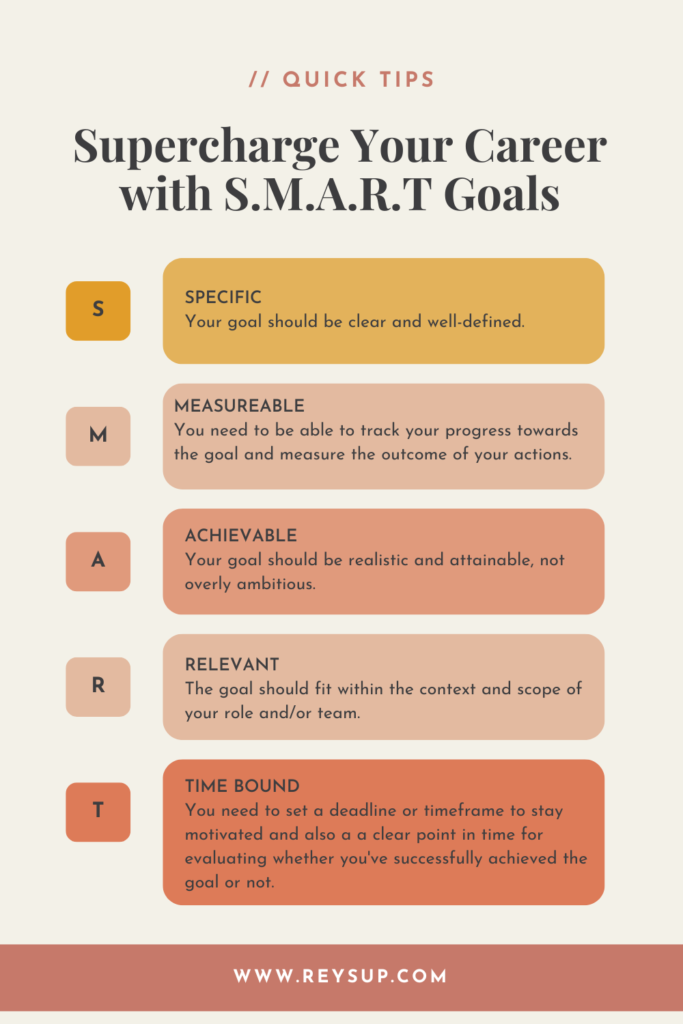SMART Goals: How to Leverage Them to Supercharge Your Career
If you are struggling at work or simply looking to improve your performance in a specific competency, you may want to consider setting SMART goals for yourself. SMART goals are widely regarded as one of the most effective frameworks for goal setting. This framework helps ensure your goals are clear, focused, and measurable. Too often, we set goals that are vague and difficult to measure, causing us to lose focus or even fall short of achieving them. This happens because the goals are too abstract and lack clear, actionable steps to guide us towards the outcome. In this article, we will dive deep into how you can supercharge work performance with SMART goals and we will even include some examples of goals to give you an idea of where to start. Let’s get into it!

What are SMART Goals and Why Do They Work in Career Planning?
SMART is an acronym that stands for Specific, Measurable, Achievable, Relevant, and Timebound. This framework helps ensure that your goals are clear, attainable, and geared towards real, tangible outcomes.
- Specific: Your goal should be clear and well-defined
- Measurable: You need to be able to track your progress towards the goal and measure the outcome of your actions.
- Achievable: Your goal should be realistic and attainable, not overly ambitious.
- Relevant: The goal should fit within the context and scope of your role and/or team
- Time-bound: You need to set a deadline or timeframe to stay motivated and also a a clear point in time for evaluating whether you’ve successfully achieved the goal or not.
When it comes to career planning, SMART goals work particularly well. This is because more times than not, your performance at work is measured by the results you drive. This framework ensures that you are setting goals with clear results and evaluating your performance throughout.

Setting SMART Goals Across Different Career Competencies
When people say they want to ‘improve their performance at work’, that could mean a million different things. Maybe they want to improve their public speaking skills, or maybe they want to get better at customer negotiations. The good news is that you can set SMART goals across practically any skill or competency that you want to improve. And while it is tempting to set a goal in many areas, it’s actually better to pick 1-2 priority areas and focus your attention there to start. This way, you can make a deliberate and focused attempt to improve and you don’t risk spreading yourself too thin.
Competencies you may consider setting SMART goals for:
1. Communication / Presentation Skills
Effective communication is one of the most important competencies you can have in the workplace. Whether you’re speaking to a group, leading a meeting, or presenting a report to a client, your ability to convey information clearly impacts your ability to drive impact and plays a big role in your overall professional success.
Example 1
- Bad Goal: Improve presentation skills with leadership team members.
- SMART Goal: Improve presentation skills by delivering a 15-minute presentation to the leadership team on the upcoming project’s strategic plan, receiving feedback from at least two team members on clarity and engagement, practicing with a mentor three times before the final presentation, and achieving this within the next 4 weeks.
Example 2
- Bad Goal: Improve email communication to clients.
- SMART Goal: Improve email communication to clients by reducing average email response time to 24 hours, incorporating a template for clearer and more concise messaging, and receiving positive feedback from at least 5 clients on clarity and effectiveness within the next 30 days.
2. Data Analysis Skills
With more and more companies looking for employees with data analysis skills, honing this expertise has never been more valuable. In fact, in fields such as marketing or product management, the ability to analyze data effectively can be a game changer and give you a significant edge on your peers.
Example 1
- Bad Goal: Get better at SQL.
- SMART Goal: Get better at SQL by completing an advanced SQL course, practicing with real-world datasets for at least 3 hours a week, and achieving a score of 90% or higher on the course’s final exam within the next 8 weeks.
Example 2
- Bad Goal: Improve customer churn rates.
- SMART Goal: Improve customer churn rates by analyzing customer feedback and sales data to identify key churn factors, implementing at least two targeted retention strategies, and reducing churn rates by 10% over the next 6 months.
3. Leadership Skills
If you are eyeing a manager or lead role at your company, you most certainly will need to show evidence of leadership skills. This is a great competency to focus on if you’ve been in your role for some time and consider yourself a top performing individual contributor already.
Example 1
- Bad Goal: Successfully lead a project end to end by myself.
- SMART Goal: Successfully lead a project end-to-end by developing a project plan, managing all phases from initiation to completion, and delivering the final project within 4 months, ensuring it meets all specified requirements and achieves a satisfaction rating of 90% or higher from stakeholders.
Example 2
- Bad Goal: Attend the leadership training seminar.
- SMART Goal: Attend the leadership training seminar by registering within the next week, participating in all sessions over the course of the 3-day event, and applying at least two key strategies learned to my current team project within 30 days after the seminar.
4. Sales Skills
Improving your sales skills is essential, not just for salespeople but for any professional involved in client-facing roles or stakeholder management.
Example 1
- Bad Goal: Increase sales conversion rates.
- SMART Goal: Increase sales conversion rates by 15% within the next 3 months by implementing new follow-up strategies, optimizing the sales pitch based on customer feedback, and tracking weekly performance metrics to adjust tactics as needed.
Example 2
- Bad Goal: Develop a new pitch for the new product feature release.
- SMART Goal: Develop a new pitch for the upcoming product feature release by creating a draft 2 weeks before launch, incorporating feedback from at least 3 peers, and finalizing the pitch with a presentation to the sales team by the end of the month.
5. Relationship-Building Skills
This competency is a universal one, and it’s something that any employee in a corporate setting should strive to improve and continuously develop. Whether it’s with clients, colleagues, or stakeholders, strong relationship-building skills are vital for anyone’s career success.
Example 1
- Bad Goal: Talk to more clients to understand how the company can better meet their needs.
- SMART Goal: Talk to at least 10 clients over the next 6 weeks to gather insights on how the company can better meet their needs, compile a report on key feedback and suggestions, and present actionable recommendations to the team by the end of the quarter.
Example 2
- Bad Goal: Re-engage with lapsed customers.
- SMART Goal: Re-engage with 50 lapsed customers within the next 3 months by sending personalized reactivation emails, scheduling follow-up calls with at least 20% of them, and achieving a 15% response rate resulting in renewed business or positive feedback.
6. Cross-Functional Collaboration Skills
In today’s modern workplace, the ability to work well with other teams and peers is not a nice to have, it’s crucial. Plus, when you collaborate with cross-functional teams, it’s easier to innovate and problem-solve. More minds is always better than one 🙂
Example 1
- Bad Goal: Collaborate more with the marketing team.
- SMART Goal: Collaborate more with the marketing team by scheduling bi-weekly meetings to discuss ongoing projects, contributing to at least one marketing campaign per quarter, and providing feedback on campaign performance, with the goal of achieving a 10% improvement in campaign effectiveness.
Example 2
- Bad Goal: Lead a cross-departmental task force to solve a customer service issue.
- SMART Goal: Lead a cross-departmental task force to resolve the #1 customer service issue we face today by organizing weekly meetings over the next 8 weeks, developing and implementing a resolution plan with specific action items, and achieving a 25% reduction in customer complaints related to the issue by the end of the quarter.
Monitoring Your Progress and Leveraging Achievements
Once you’ve set your SMART goals, don’t forget to monitor your progress over time! Use tools like spreadsheets or project management software to track your milestones. This way, you stay on course and don’t get distracted with other priorities.
Here are some tactical ideas:
- Check-in regularly with yourself: Schedule weekly or monthly reviews of your progress across all of your competency areas. This will allow you to adjust your strategies if needed and keep you accountable.
- Seek feedback: Regularly ask for input from managers, peers, or mentors to ensure you’re on the right path.
- Document achievements: Keep a record of your accomplishments and the specific impact they’ve had on the company. For example, if you’ve improved sales or reduced costs, quantify these improvements and write it down so you don’t forget!
When it comes time for your performance evaluation, pull up your SMART goals and show your manager the progress you have made against them. Highlight how these goals have contributed to your personal development and your team’s or company’s success. This approach shows your manager that you’re proactive, goal-oriented, and focused on continuous growth.
If you enjoyed this article, make sure you check out our other related post on 9 Simple Ways to Improve Your Work Performance Immediately.




